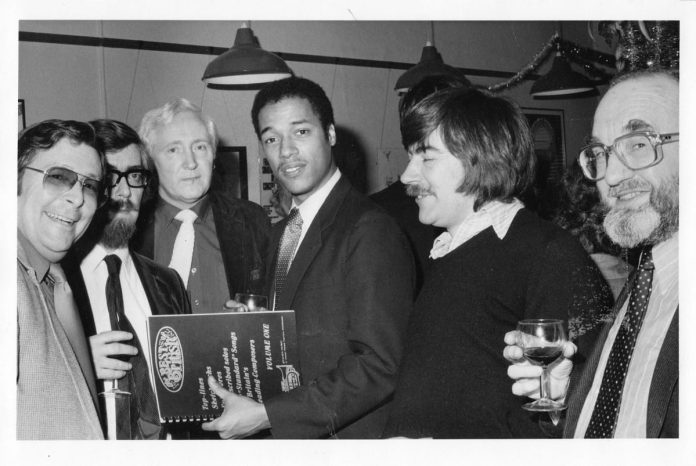
The best thing about this November session at the Cockpit, the ILEA Arts Centre in Marylebone, was that there was no need at all for the critic to come away desperately trying to be kind, producing patronising phrases about the lad’s promise and enthusiasm, the aren’t-they-good-for-their-age? scene; there was plenty to enjoy without having to make allowances.
Bill Ashton directed a line-up featuring: Richard Pearce (tpt/fgl-h); Alan Leggatt, Ian Pitch, Ray Harris, Colin Bastin (tpt); Ken Gray, Paul Reynolds, Peter Teychenne, Adrian Sheen (tbn); Heather Brundish (flt); Ted Rockley (alt/ clt); Chris Biscoe (alt); Roger Corkwell, Brian Ling (ten/clt); Michael White (bar); Richard Garrad (tuba); Mike Dore (fr-h); John Mansell (gtr); Jean-Alain Roussel (pno/el-pno); Paul Westwood (bs/bs-gtr); Brian Johnson (dm).
It’s perhaps because the Cockpit is circular that I couldn’t assess the French horn’s contribution, and that the trombone section sounded woolly; all these players had their backs to me. Paul Reynolds seems to be the featured trombonist, but this must have been an off night for him, since his solos on Down In The Hollow and Alan Wakeman’s Summer Mondays were very uncertainly pitched. The trumpet section was more together, and Richard Pearce played an excellently phrased flugel solo on Negev, proving however that it’s hard for most players of this instrument not to sound like its famous Stateside blowers.
Jean-Alain Roussel is a real bluesman, but his boisterous enthusiasm, in evidence throughout, served him ill on the blues in 6/4, Six To One Bar as his solo became uncontrolled and incoherent. Paul Westwood was better on string-bass than on the stiffer bass-guitar, and John Mansell comped tastefully when the rest of the band didn’t drown him.
Finally, especial praise must be bestowed on the reeds, who swung most excitingly through some Hermanian writing on the aforementioned Six (a Harry South composition). And in Chris Biscoe, they have an altoist with feeling and drive, who can surprise you by beginning to rip off a Parkeresque run, then change to a Hodges-like glissando with telling effect. I’m going to watch the progress of this band with considerable interest.















